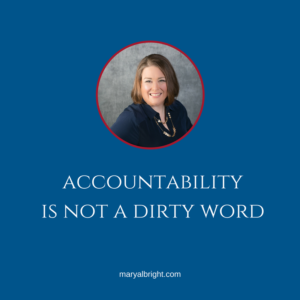
Fred, the aquatics supervisor of the local YMCA, is responsible for scheduling lifeguards in the pool. He’s also responsible for hiring staff so he has enough lifeguards on the schedule. This location is very short staffed. Four lifeguard applications came in and sat in Fred’s inbox for over six weeks. When David, a new aquatics lead, came onboard, he was asked to help with the hiring. David called the four applicants to set up interviews. All four had already found other positions. David asked Fred why he hadn’t called those applicants sooner, Fred replied, “I forgot they were there. HR should have sent me a reminder.”
Accountability is responsibility.
Fred got caught; he didn’t act in a timely fashion. He didn’t take accountability for his actions and tried shifting the responsibility to HR.
Why do we do this? “HR should have sent me a reminder.” That’s a bullshit statement that nobody believes. And frankly, it shines the spotlight on Fred’s lack of responsibility. There’s this false stigma out there that somehow, you are supposed to be perfect. It’s victim mentality: Blaming others, personal excuses, waiting and hoping it gets better.
Newsflash; you’re human. You’re not perfect.
Leaders: The same goes for you. You’re human; you’re not perfect. And neither are your people, even the A-players. There’s always an opportunity to grow.
Everyone has a lot on their plates. I’ll give Fred the benefit of the doubt. Was he overworked? Was he poorly trained? Maybe if Fred had an accountability mechanism in his organization, he could have learned from that situation and improved for next time instead of playing the victim.
Accountability systems are incredibly valuable to leaders and their people. Basically, we’re talking about three fundamentals:
- Acknowledge reality. (It happened.)
- Own it. (Personal responsibility)
- Find the solution. (Fix it.)
As a leader, sometimes you wear multiple hats each and every day. Helping your team be accountable for the organizational goal (or heck, completing quarterly actions designed to build the team up) may take up a larger wedge of your time than you have. It’s easy to let accountability slide and let it fall into the “dirty word” category that people start to hate.
Set the standard that everyone takes personal responsibility for their actions.
It’s human to say, “I missed that. Let me take care of it now.” When someone says that, it makes the situation collaborative instead of corrective. Help people to move into that space where taking personal responsibility is habit and expected. You think and behave differently when you take personal responsibility, . You look for improvement opportunities.
Use your resources. Bring someone in if you find yourself short on time. A good leadership coach will align with your values, take problems off your plate, save you time and coach where needed to get the work done correctly. Help the world see that personal responsibility is a good thing.